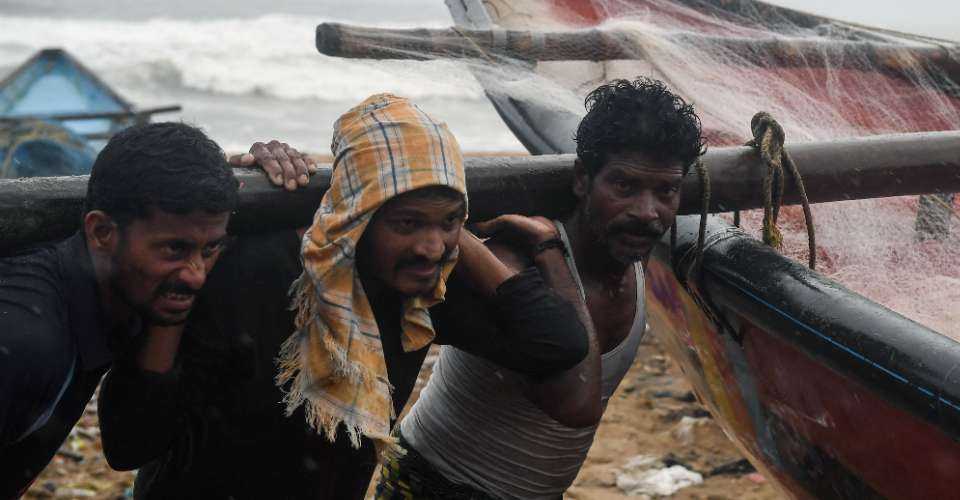
Over 4,000 Catholics, mainly fishermen and their families and the clergy from coastal regions of Tamil Nadu, attend St. Anthony’s feast on the uninhabited Kachchativu island in Sri Lanka. (Photo: AFP)
The pomp and glory of St. Anthony’s feast on an uninhabited island in Sri Lanka has ebbed this year with the decision of Indian Catholic fishermen to boycott the annual festivity.
Defying their decades-old practice, fishermen from the southern Indian state of Tamil Nadu, which shares a maritime border with Sri Lanka’s northern region, will not turn up for the two-day feast on the uninhabited Kachchativu island in Sri Lanka, starting Feb. 23.
“Every year, we look forward to attending the feast with our fellow brothers and sisters from Sri Lanka in the spirit of friendship and harmony. But this year, we were forced to cancel it,” said P. Jesu Raja, president of the Rameswaram Mechanized Trawlers’ Union in Tamil Nadu.
Indian fishermen have been protesting the island nation’s unjustifiable prosecution of a group of 23 fishermen from Rameswaram in Tamil Nadu who were taken into custody by Sri Lankan Navy personnel on Feb. 3.
The Kayts Magistrate Court in Jaffna last week handed six-month jail sentences to two fishermen for intruding and illegally fishing into Sri Lankan waters.
Another fisherman was sentenced to one-year imprisonment for entering Sri Lankan territorial waters and fishing without a valid permit.
All 23 fishermen were handed eighteen months imprisonment, suspended for five years. However, 20 of the fishermen were released on humanitarian grounds.
“We cannot accept putting fishermen in jail for engaging in fishing,” Raja told UCA News.
The protesting Indian Catholic fishermen mostly hail from Rameswaram. The town on Pamban Island in Tamil Nadu is about 55 kilometers away from the Sri Lankan coast.
According to the agreement between the two governments, Indian citizens can visit Kachchativu without an Indian passport or a Sri Lankan visa.
The shrine of St. Anthony is the only structure on the island, built by a prosperous Catholic fisherman from Tamil Nadu in the 20th century.
In a public notice, St. Joseph’s parish in Verkottu in Rameswaram has said that Catholics from Tamil Nadu will not be able to attend the feast due to protests by fishermen.
Saint Anthony is considered the “guardian of the sea” by the fisher folk of both nations. The feast of the shrine, now under the Jaffna diocese in Sri Lanka, served as a link between fishermen from the two countries.
Over 4,000 Catholics, mainly fishermen and their families and the clergy from coastal regions of Tamil Nadu attend the feast.
This year they were to attend a Mass on Feb. 24 along with their Sri Lankan brethren as per the decades-old tradition among the two communities.
From Sri Lanka, 3,500 devotees from various parts of the country are scheduled to attend the feast this year and the main celebrant is Bishop Justin Bernand Gnanapragasam of Jaffna, where a large number of fishermen, tracing their origin to Tamil Nadu, stay.
The fishermen in Tamil Nadu have been protesting before the district administration to free their three colleagues held captive in Sri Lanka.
Bottom trawling is banned in Sri Lanka considering it harmful for fisher stocks. It is made punishable with tough penalties and jail sentences.
Both the Sri Lankan and Indian governments have failed to resolve the issue amicably, which is causing the Indian fishermen to suffer, Raja alleged.
Sri Lankan fishermen expressed solidarity with their Indian counterparts by protesting in front of the Indian mission in Jaffna on Feb. 20.
Fishers from India and Sri Lanka have historically fished alongside each other in the Palk Strait, a narrow gap between the two nations. Kachchativu was often used to sort out the catch.
In 1974 and 1976 treaties were signed between the two countries to demarcate the International Maritime Boundary Line (IMBL).
The peace in the Pak Strait lasted until 1983 when the 26-year-old civil war broke out in Sri Lanka.
Though the civil war for a separate nation for the Tamil community in Sri Lanka ended in 2009, Sri Lankan fishermen have been objecting to Indians fishing in their waters.
Both nations set up a Joint Working Group on Fisheries in 2016, but it made little progress in resolving issues that affected fishermen in the region.
